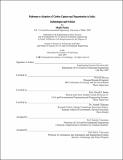Pathways to adoption of carbon capture and sequestration in India : technologies and policies
Author(s)
Narain, Mudit
DownloadFull printable version (981.9Kb)
Alternative title
Pathways to adoption of CCS in India
Other Contributors
Massachusetts Institute of Technology. Technology and Policy Program.
Advisor
Howard Herzog and David H. Marks.
Terms of use
Metadata
Show full item recordAbstract
India is the world's second most populous country with a rapidly growing economy and increasing emissions. With the imminent threat of anthropogenic climate change in the coming decades, helping to control India's emissions will have to be a global priority. Carbon capture and sequestration (CCS) can play a pivotal role in reducing India's emissions in the future, given India's reliance on coal power and the large coal reserves. The motivation for this dissertation is the need to ascertain the current situation and conditions relevant to carbon capture in India so as to help guide the processes to prepare for large scale adoption if desired in the future. For carbon capture to be undertaken at a significant scale, various pieces will have to fall in to place in sync with each other. The technological capability would have to be complemented by adequate geological capacity under the umbrella of the right policies. Adoption of carbon capture would need a tailored approach for each country and for a diverse country the size of India, these approaches may need to be customized even locally to each region. (cont.) The objective of this thesis is to increase the understanding of the opportunities, issues and challenges amongst the stakeholders regarding CCS in India regarding the capacity, political structures and policies. To address the objective, this dissertation analyzes the current power and coal sector situations, geological capacity for sequestration in India, the political decision making structures and the current views of the relevant civil servants in this field. At the end, there are some recommendations for the government of India and the international climate and CCS community to make conditions conducive for CCS in India.
Description
Thesis (S.M.)--Massachusetts Institute of Technology, Dept. of Civil and Environmental Engineering; and, (S.M.)--Massachusetts Institute of Technology, Engineering Systems Division, Technology and Policy Program, 2007. This electronic version was submitted by the student author. The certified thesis is available in the Institute Archives and Special Collections. Includes bibliographical references (p. 83-85).
Date issued
2007Department
Massachusetts Institute of Technology. Department of Civil and Environmental Engineering; Massachusetts Institute of Technology. Engineering Systems Division; Technology and Policy ProgramPublisher
Massachusetts Institute of Technology
Keywords
Civil and Environmental Engineering., Technology and Policy Program.